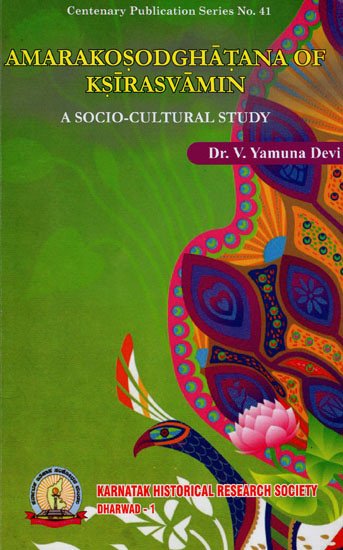Amarakoshodghatana of Kshirasvamin (study)
by A. Yamuna Devi | 2012 | 77,297 words | ISBN-13: 9788193658048
This page relates ‘Kshirasvamin’s citations of Bhoja’ of the study on the Amarakoshodghatana of Kshirasvamin (in English) which represents a commentary on the Amarakosha of Amarasimha. These ancient texts belong the Kosha or “lexicography” category of Sanskrit literature which deals with the analysis and meaning of technical words from a variety of subjects, such as cosmology, anatomy, medicine, hygiene. The Amarakosa itself is one of the earliest of such text, dating from the 6th century A.D., while the Amarakoshodghatana is the earliest known commentary on that work.
Kṣīrasvāmin’s citations of Bhoja
Kṣīrasvāmin cites Bhoja, as a grammarian and commentator; a few instances are presented below while some are presented in the relevant instances in previous chapters.
(a) Bhoja’s commentary on Amarakośa—
In interpreting the introductory verses of Amarakośa, Kṣīrasvāmin quotes the opinion and interpretation of Bhoja on the same verse which evidences that Bhoja also wrote a commentary on Amarakośa[1] –
śrībhojastvanyathāvyākhyat—yathaite dvandvaikaśeṣasaṅkarāḥ kramādṛte paryāyanirdeśam vinā bhinnaliṅgā yadyuktā nasyustadā nakṛtaḥ paryāyanirdeśaṃ vinā tūktānāṃ kṛtā eva yathā vidyādharāpsaroyakṣarakṣogandharvakinnarāḥ | tathā putrau putraśca duhitā ca | tathā nānārthe—saṃjñā syāccetanā nāma hastādyaiścārthasūcaneti |
(b) Ilvalāḥ (I. 12. 24; p. 28)—
[Stars:]
Deriving the word Kṣīrasvāmin, prefers the reading iṇvakāḥ meaning ‘pleasing’, quoting the Śruti text. He also gives the opinion of Bhoja according to whom ilvala is an asura–
invakā iti pañca tārāḥ | invanti prīṇantīnvakāḥ maruto devatā invakā nakṣatramiti śruteḥ | ilvakāstarakā ilvalo'sura iti -uṇādau śrībhojadevo vyākarot |
(c) Dhavala (I. 4.13; p. 41)–
[White:]
Kṣīrasvāmin derives dhavala and gives the sūtra of Bhoja for the shortening of the vowel in the root dhāva–dhūyate malo'sya dhavalaḥ dhāverhrasvaśceti śrībhojaḥ |
(d) Raktapā (I. 9.22; p. 65)–
[Leech:]
Jalauka is another synonym for leech. Deriving the word Jalauka, Kṣīrasvāmin quotes Bhoja[2] who says that it should be derived like the word śālūka–śālūkādivajjalūketi śrībhojaḥ |
(e) Utpala (I.9.37; p.68)–
[Water Lily:]
Kuvalaya is another synonym of utpala; Deriving the word kuvalaya, Kṣīrasvāmin quotes the view of Bhoja that the petals of water lily are arranged asymetrically–
kutsito bahirvalayaḥ patraveṣṭanamasyeti śrībhojaḥ |
(f) Cūta (II.4.33; p.88)–
[Mango:]
Deriving the word Kṣīrasvāmin also records the derivation of Bhoja—
(g) Vāravāṇa (II.8.64; p.188)–
[Armour:]
Deriving the word, Kṣīrasvāmin presents the derivation of Bhoja as—
vānamasya vāravāṇaḥ pūrvapadātsajñāyāṃ (Pā. VIII. 4. 3) iti ṇatvam |
vāṇavārasya vyatyayenamayūravyaṃsakāditvāditi śrībhojaḥ |
Whereby he says that the words vāṇa and vāra have interchanged their positions in the compound word forming Vāravāṇa like in the mayūravyaṃsakādi where the viseṣaṇa and viseṣya get interchanged.
(h) Uraṇa (II.9.76; p.217)–
[Ram:]
Etymologically explaining the word, Kṣīrasvāmin also gives the interpretation of Bhoja who opines that the gods are pleased (by the offering of rams)–
evamuccairaṇo'syetyuraṇaḥ | uraṇyati devatāḥ prīṇātīti śrībhojaḥ kaṇḍvādipāṭhāt |
(i) Vratatiḥ (III.3.67; p.285)–
[Creeper:]
Kṣīrasvāmin derives the word as:
vrajantī tatirasyāṃ vratatiḥ |
He observes that according Bhoja in the derivation of words like vrata, vrāta, vratati and others ‘vrati dhātu’ is to be taken as the base—
vratavrātavratatyadisiddhyarthaṃ vratidhāturunneya iti śrībhojaḥ |
(j) Sīvanam (III.2.5; p.261):
Kṣīrasvāmin derives this word with the help of the sūtra ṣṭhivusivyordīrghaśca vā | of Bhoja’s (Sarasvatīkaṇṭhābharaṇa—II.4.167) which optionally ordains the lenghthening of the vowel in the root.
(k) Paraḥśatā (III.1.64; p.249)–
[Countless:]
In the context of deriving the word Kṣīrasvāmin remarks that Bhoja considers paraḥ in the compound Paraḥśatā and others to denote countless, as a nipāta and cites examples–
śatātparaṃ paraḥśataṃ yat—
brahmādayo brahmahitāya taptvā paraḥsahasrāḥ śaradastapāṃsi |
śrībhojastu paraḥśabdaṃ nipātaṃ manyate |
yathā—
parovaraḥ parokṣam |
(l) Dyu (III.4.21; p.341)–
[Day:]
Kṣīrasvāmin records the statement of Bhoja in explaining the term pūrvedyu; Bhoja, says Kṣīrasvāmin considers Dyu as dina that is day time; his example–“how could the moon shine in day time” makes this clear–
dyurdinamiti śrībhojaḥ yathā—dyuścandro dyotate katham |
(m) Kāmam (II.9.57; p.212-13)–
[Voluntarily:]
Amarakośa gives six synonyms for the word. Kṣīrasvāmin in the context of deriving these words remarks that Bhoja was confused in taking these as indeclinables.
Kṣīrasvāmin quotes Śāśvata in support of his view–
prāyaḥ kriyāviśeṣaṇānyetāni āta evāvyayatve eteṣāṃ śrī bhojo bhrāntaḥ yacchāśvataḥ -kāme nikāme kāmākhyā |
(n) Kīnāśaḥ (III.3.215; p.323-24)–
[Yama:]
Deriving the word Kṣīrasvāmin cites the opinion of Bhoja who says that the nipāta ‘kī’ is ordainedin the meanings of kīśa, kīca, kīṭa and others–
kīśakīcakīṭādyarthaḥ kī nipāta iti śrībhojaḥ |
Footnotes and references:
[2]:
It may be noted that the term jalūka used by Bhoja has been termed jalauka by both Amarakośa and Kṣīrasvāmin 266
